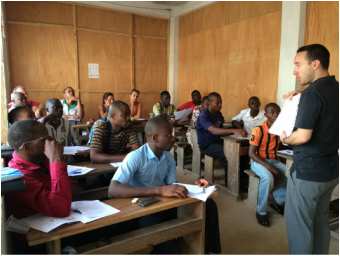
There’s plenty of work left to do to make sure teachers’ professional development is worthy of the job they do, but in Togo, West Africa, as in so many places around the globe, teacher training—any training at all—is a luxury. Creating a sustainable program to train teachers in basic pedagogy seemed like a steep uphill climb in the three months my wife and I spent in Togo, but the appetite for something new allowed us to start a program with promise and empower local teachers to take it from there. With teachers all over the world in need of the most basic pedagogical training, it’s a goal worth fighting for, one community at a time.
A couple months ago, I wrote about my initial observations of classes where discipline policies are antiquated, student participation is rare, and teachers are more focused on finishing lessons than teaching students. In the two months that followed my last piece, my wife and I designed and implemented a teacher training program for local Togolese teachers on basic pedagogy skills, including differentiation by learning style, positive discipline, checks for understanding, and lesson planning.
We began slowly, but interest in our trainings grew as word of mouth spread. During one week spent in a rural village conducting trainings, we had 100 percent attendance.
It’s a delicate task to share positive discipline approaches with teachers who not only beat their students but who were also raised by teachers and parents who did the same. While we expected more resistance from them, what we found was simply a group of teachers interested in how to do their jobs better. Getting the students out of their chairs and learning on the move might seem like an exercise in chaos to many of these teachers, but they learned how to activate student’s interests with interest of their own. They stepped out of their comfort zone, questioned both their own methods and ours, and began to experiment and find what works in their own classes. In the end, that has to be the goal of any effective professional development: lighting a spark that leads to trial and error, and, in the end, better results.
As with any program, but especially one where foreign teachers are acting as the experts, it’s critical that local observation and input guides what needs to be addressed and how. But more than that, the people who will stay in these communities to do the hard work ahead must feel ownership over the process. So as time went on, we wanted to make sure that our efforts in Togo would continue to ensure that teachers all over the country would have the chance to learn their subject area and their trade, preparing them to step into classrooms everyday full of dozens of attentive students. And we wanted to make sure Togolese teachers were ready to lead the way.
We selected two teachers who excelled in our trainings, Jonas and Kokou, and with the help of a local NGO, SADA Togo, we prepared them to continue our trainings after we left. Jonas was easily the shining star of our training series and, amazingly, the same man who led the hard-to-watch class I described in my post two months ago. He absorbed new strategies like a sponge, articulated them in his own words, and immediately put them to use in his classroom. When I observed him in our final days in Togo, instead of wanting to smack my palm to my forehead like I did two short months before, I felt like throwing them into the air and screaming, “Hooray!”
This week, Jonas and Kokou will give their first training as our new SADA Togo teacher trainers. This program is only funded for three short months, but it has a bright future ahead of it with inspired teachers leading the way. If you’d like to contribute to the project, you can do so here. I hope this program grows and that we can all ensure that teachers around the world who are hungry to help their students have the tools and skills they need to get the job done.
Scott Goldstein, guest blogger, is a D.C.-based teacher and teacher trainer spending this school year training teachers abroad in Indonesia, Togo, and Mexico. He was a blogger for Recess in 2013-14. Reach him via email or Twitter.

 RSS Feed
RSS Feed